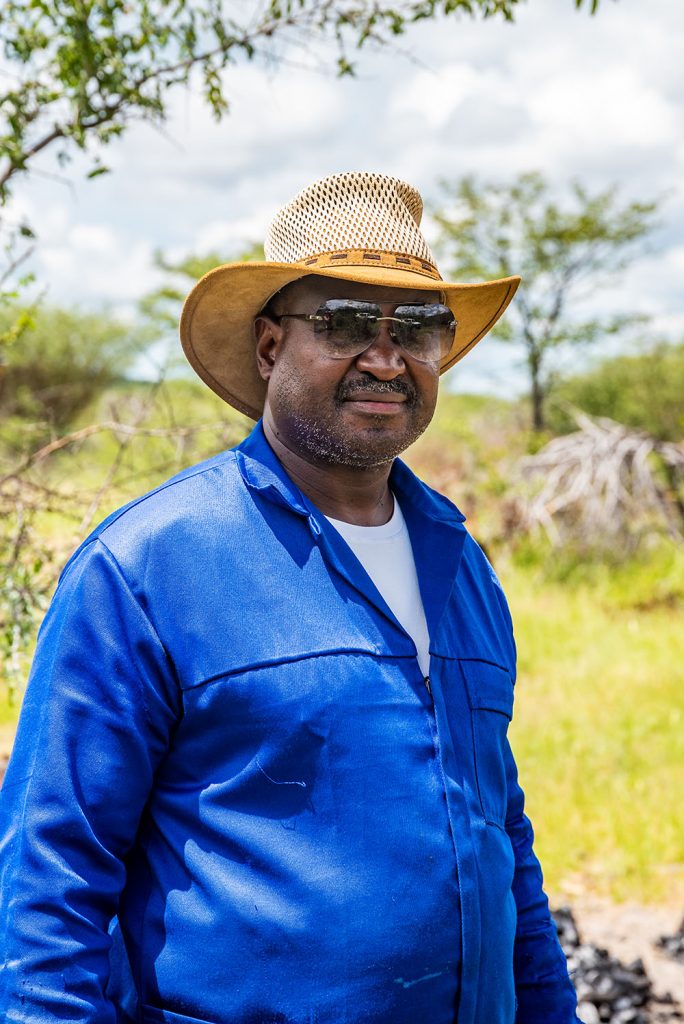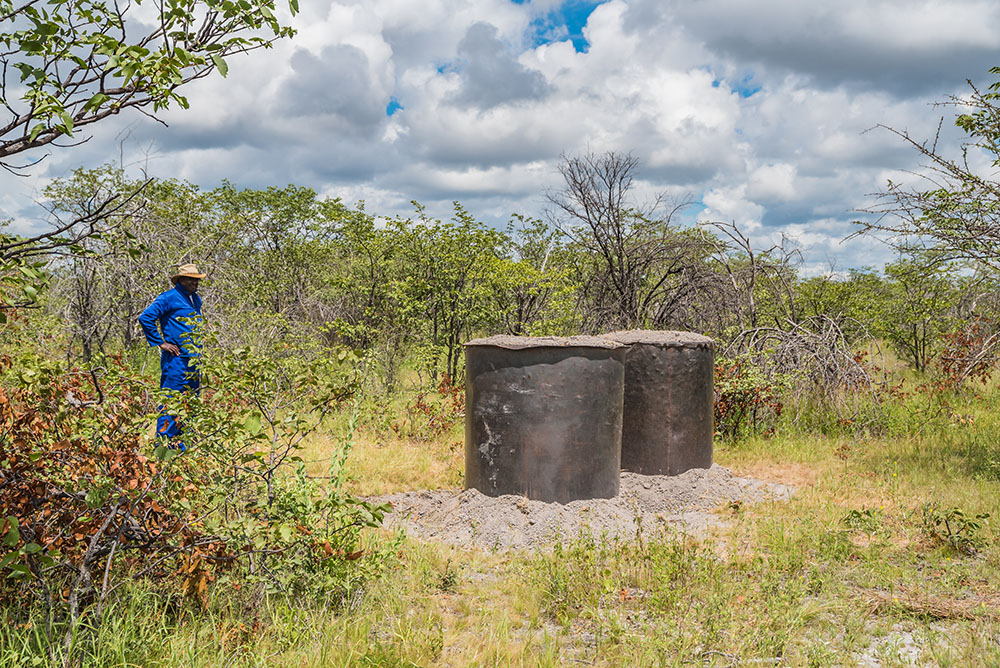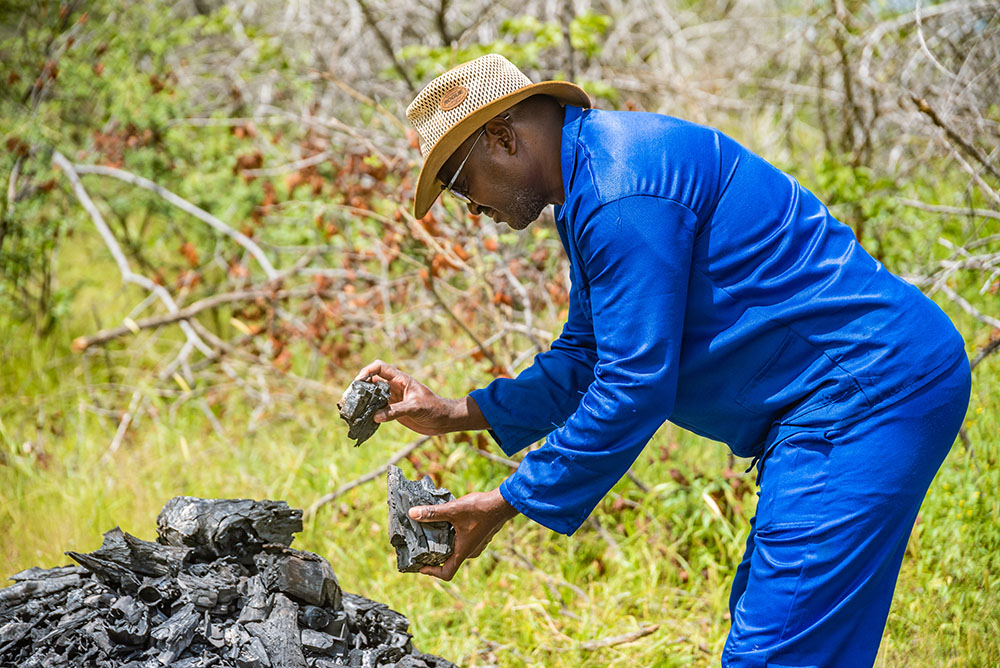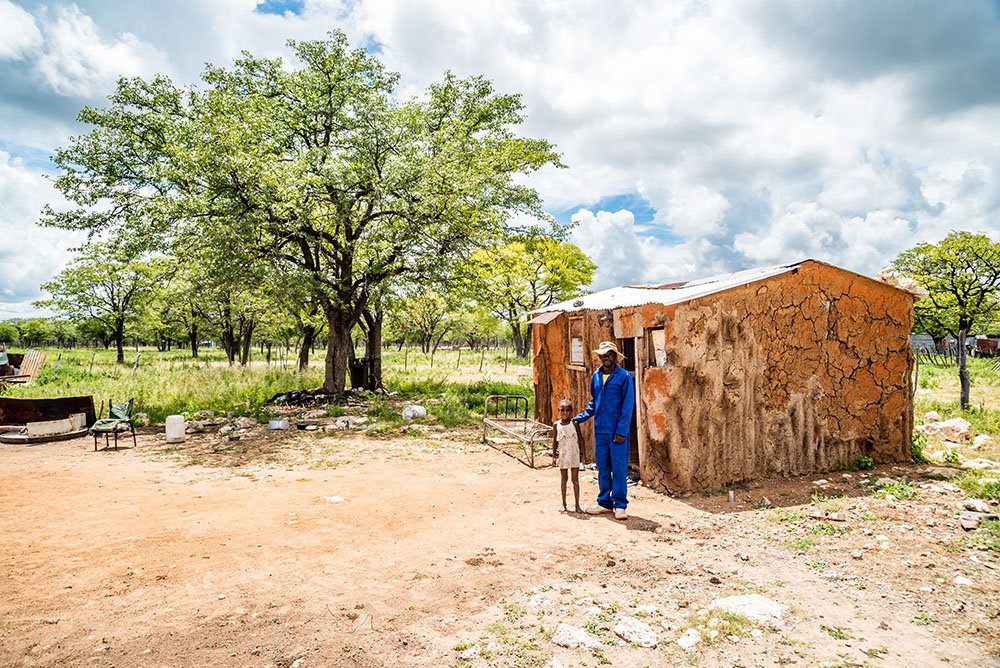How a Generational Farmer is Advancing His Family Farm using Quality Environmental and Social Practices
~

Mbati Tjiho is a generational farmer who traded in his twenty-five-year office job to explore his passion for farming in 2017. Farm Winnie, which was a predominant livestock production farm, is found close to the town of Outjo, in the Kunene Region of Namibia. Mbati has seen first-hand the impact of bush encroachment on his family farm. “Some farms in my area, have much more grass than our farm. Our farm was overgrazed and encroached. Today the grass doesn’t grow that high, but it is something I am correcting.”
Mbati explains “I realised that there is an opportunity in the farming industry, with the encroaching bush in Namibia. It is a huge problem for livestock grazing. Some people have even started adding value to the bush. Either for charcoal production, firewood production, or biochar and many other products. The reason why I embarked on bush thinning was to improve the grazing capacity of the farmland.”
Turnover for Mbati’s Farming Business
“When I started farming, my father was doing some charcoal production, but I didn’t know how big the production should be for it to be profitable. Unfortunately, my father passed away at the end of 2017 and I had to take over the operations of the farm. At the beginning of 2018, I became a member of N-BiG” explains Mbati, referring to the Namibia Biomass Industry Group (N-BiG), a support organisation to the Namibian biomass industry.
“With their assistance, we assessed the vegetation composition. We did the calculations per hectare as well as for the overall farm and concluded that there is a lot that I can do here. However, I didn’t have much experience then, so I had to knock on different doors in the industry. I also then became a member of the Namibia Charcoal Association (NCA).”
At that time, if there was any article about the industry, I would be reading it. Any opportunity to attend training or workshops, I would be attending those. I did this to gain an understanding of the industry. Then I started with my production.”
“When I took over from my father, the production was very small. My father had twelve kilns; this would produce enough to supply two to three trucks per year. I used my savings to acquire more and push our numbers to thirty kilns.”

Demand that Drives Sound Environmental Practices
Charcoal is an essential export commodity and the demand is rising globally. Namibia ranks among the top ten charcoal exporting country. As Mbati explains, he quickly realised that the real driver of the charcoal industry today is the demand for quality products. “I realised the issue of demand and the requirements of the customers where the products are being sold, especially in Europe the customers are conscious about their products. They need to meet environmental and social standards. This was when I first heard about FSC”, explains Mbati.
There are policies and standards in place to ensure sustainability and environmentally sound practices define the charcoal industry in Namibia. One such gold standard of quality environmentally practices is that of FSC certification. The Forestry Stewardship Council (FSC) promotes responsible management of the world’s forests, by allowing consumers a way to identify and then, support with their purchase, products that are derived using responsible, fair and sustainable practices. For this, FSC sets standards and provides a system for certification of organisations which want to market their products as FSC certified.
Namibia has 1,6 million hectares of FSC certified area with approximately 320 landowners / managers. For a supplier to become FSC certified, they would need to meet certain principles and requirements including social aspects by providing quality living and safe workspaces, as well as sound environmental practices by ensuring only encroaching species are removed or harvested and that this is done sustainability.
“At first it sounded like an insurmountable task, a big one. But we had the product and we needed to sell it. I am on the production side. I don’t process, I sell in bulk to processors who package the charcoal. Most of the processors and buyers are FSC certified, and of course, the rate for FSC suppliers is higher than non-FSC.”

“I then approached NCA and they connected me to the CMO group”, explains Mbati. CMO offers services to natural resource-based industries and manages an FSC group scheme for charcoal producers in Namibia.
How This Farmer Became FSC Certified
“Becoming an NCA member opened this door for me. The association was very instrumental in assisting me with the necessary steps for certification.” Mbati explains there are requirements that a producer must first meet to become FSC certified. For example, “things like protective clothing, having first aid kits, housing and some ablution facilities, training the workers, putting physical structures in place, meeting places and so on.”
Housing for workers is another requirement to become FSC certified. As Mbati explains, he always wanted a sustainable approach to his business and becoming FSC certified, “just fast-tracked my plan.” “Even in the Forestry Act of Namibia, requirements are saying you shouldn’t cut down protected trees, and you can cut problematic trees such as encroachers. So, FSC compliments and ensure that we comply with our national regulations and laws. This is very important.”
Another important aspect of FSC certification, as Mbati explains, is “we needed good record keeping structures to be put in place. FSC certified producers or companies are regularly inspected by external auditors from accredited certification bodies. As such, your activities are monitored and evaluated. This is a good business practice. In any business, you need to maintain record-keeping.”
According to Mbati, while the process may require effort at the onset, complying with the FSC standards is not difficult to maintain. “It’s not difficult for you as a producer, or as the owner of the operation. In the beginning, it might be a little bit difficult because of the cash flow.”
The Benefits of FSC Certification
Like most things though the gains are in the long term. “If you compare my rate per tonne to the other non-FSC producers, my average is two thousand fifty dollars per tonne compared to one thousand six hundred or seven hundred per tonne. Then, of course, there is the guarantee or certainty that once your product is ready the processor will take it. There is a buyer and even if your buyer is full you can go to another buyer who is FSC certified.”
Mbati notes that initially, it helped his process to be part of a group scheme together with CMO, especially in the securing of buyer markets, however, that this didn’t mean that he could sit back.
Offsetting the effort is the environmental gains according to Mbati. “I think one thing you should take into consideration is the environment. The sustainability of the production and your farmland. All those aspects are very important because indirectly today you don’t feel it, but you will tomorrow.”

When asked if he would recommend the process to other farmers, Mbati says, “Definitely. I’ve even told my neighbours to get certified. It’s a huge advantage. Luckily we already had some houses for our workers, so we just had to improve on them, and then it was the record keeping. So, I’ll tell everybody to go for FSC, especially for producers who want to sell their charcoal for export. My observation is that if you do an investment today, tomorrow it will be an asset to you.”
As Mbati notes, “Wherever you go in life, you will find challenges. You just need to come up with mitigating measures to overcome those challenges. I’m looking forward to improving and growing even more.”
Further sources
Watch the FSC International series of videos on Certified Charcoal Production in Namibia
Read up on the FSC Southern African website about 1.6 million hectares of FSC certified land in Namibia since April 2020
Download the NCA Charcoal Best Practice Guide of 2018
[wpfilebase tag=file id=143 /]
